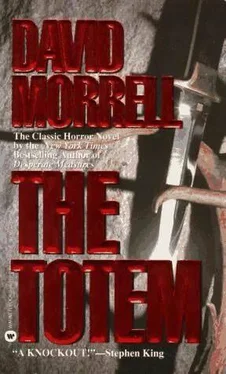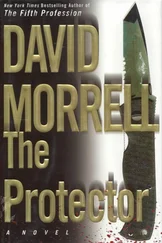David Morrell - The Totem
Здесь есть возможность читать онлайн «David Morrell - The Totem» весь текст электронной книги совершенно бесплатно (целиком полную версию без сокращений). В некоторых случаях можно слушать аудио, скачать через торрент в формате fb2 и присутствует краткое содержание. Жанр: Триллер, на английском языке. Описание произведения, (предисловие) а так же отзывы посетителей доступны на портале библиотеки ЛибКат.
- Название:The Totem
- Автор:
- Жанр:
- Год:неизвестен
- ISBN:нет данных
- Рейтинг книги:4 / 5. Голосов: 1
-
Избранное:Добавить в избранное
- Отзывы:
-
Ваша оценка:
- 80
- 1
- 2
- 3
- 4
- 5
The Totem: краткое содержание, описание и аннотация
Предлагаем к чтению аннотацию, описание, краткое содержание или предисловие (зависит от того, что написал сам автор книги «The Totem»). Если вы не нашли необходимую информацию о книге — напишите в комментариях, мы постараемся отыскать её.
The Totem — читать онлайн бесплатно полную книгу (весь текст) целиком
Ниже представлен текст книги, разбитый по страницам. Система сохранения места последней прочитанной страницы, позволяет с удобством читать онлайн бесплатно книгу «The Totem», без необходимости каждый раз заново искать на чём Вы остановились. Поставьте закладку, и сможете в любой момент перейти на страницу, на которой закончили чтение.
Интервал:
Закладка:
THREE
The medical examiner scowled. He had been a star in his profession once, back in Philadelphia, but that had been ten years ago. Born and raised in Potter's Field, he had left the town to go to school. A doctor's son, he'd wanted to be like his father. He had guessed that he would be a surgeon, but when he had finished pre-med, staying on at Boston for his training, he had found that diagnostics more than surgery attracted him. His father had approved. After all, those specialties were quite compatible. A lot of men could cut, but not as many could detect a cause, and a combination of both could earn considerable fees.
But the son had soon determined he would specialize much more than that. Searching out diseases not just in the living but the dead as well. Pathology, and in particular those duties strictly relegated to a medical examiner. The father had been livid, but for reasons that the son had not expected. Granted that a medical examiner had little chance to make the money that a surgeon could. "But autopsies!" the father had shouted. "You should want to cure the living, not dissect the dead!" The son had not been able to explain himself. The best that he could manage was the notion that determining the cause of death could help prevent another death just like it. But the argument was not convincing, even to himself. He sensed that there was another reason, although that reason wasn't clear to him, but he had made his choice, and despite his father's angry objections, he had continued with his studies.
Even when his father threatened not to pay his tuition, he'd persisted, working part-time, getting money any way he could. As well as with his father, he had trouble with some teachers. They felt that working with the dead was self-defeating for a doctor, and they had tried to change his mind, but he was adamant. Everyone agreed, though: he was good at what he did. He finished in the upper tenth of all his classes, and when he completed all his training, he had little trouble finding work. By then, he and his father no longer spoke to one another. He was certain he would not go back to Potter's Field. The place he chose was Philadelphia, and in five years, he rose from simply being on the staff to acting as assistant medical examiner. The hard jobs he was always given. More than that, he sought them out: the murders that were mystifying, and those deaths that no one understood, those suicides that maybe had been awkward accidents. He solved them all. It got so other members of the staff would come to watch him do his work. There were betting pools to see how long he might be stymied by a body's puzzle. Homicide detectives hoped that he would be assigned to their investigations. Reporters interviewed him. Magazines did stories on him. Once he even had an article devoted to him in Time .
And so his star had risen, with it self-understanding. He grew to comprehend that what attracted him were riddles from mute witnesses, the pleasures of the chase. Oh, sure, if he had stayed in diagnostics, he'd have had his share of puzzles, but the kind he worked with now were so much different, so more final and detached. He didn't have to bother with compassion, even fear, both in himself and in his patient. He could be objective, logical, and most important, uninvolved. A body there before him, he had this and this to learn about it; he would learn these things, and then this problem would be finished. Except for his excitement as he sensed that he was getting closer to the clue that he was looking for, he never felt emotion. No, that wasn't true. He often felt frustration, but excitement and frustration were related, one the polar feeling of the other, and the satisfaction of his work was in his scientific method, in his order, in the truths that he uncovered.
"After all, it doesn't matter. Nothing does," he often told himself. What profit if you diagnose a living person and that patient dies because there isn't a way to cure him? Granted, there were times when you could find out what was wrong with someone and stop the illness. But the end was still the same. If not on this occasion, maybe the next time, and finally the end was certain. Every person died. There wasn't any way to stop that. People just marked time. He couldn't bear the thought of caring for a patient and then failing.
"Self-defeat," his father had said when he first suggested that he'd like to be a medical examiner. His father had been wrong, though, for the self-defeat was not his study of the dead but how his father had prolonged the agony of someone's living. Tomorrow and tomorrow. Life is just a sequence of small losses. All those phrases now occurred to him, but back then he had not been wise enough to understand them, to call them up against his father. It was just a matter of one's viewpoint. Life was either good, or else it wasn't. In the long run, did it matter if you saved a man from this disease and spared him for another? The final truth was what he studied on the table.
Something else. A corollary. He would never have the strength to watch a patient die. He didn't have the courage. He was fearful of mistakes, and even if he made none, he was fearful of the look in someone's eyes should he be forced to pronounce a death sentence. He could never tolerate responsibilities of ultimate consequence. Certainly he had responsibilities in this profession, but if he failed, what difference did it make? A murderer would walk the streets. A suicide would never be detected. But he couldn't change what they had done; he couldn't replay time and alter things. The pain of what they did was past. He hadn't been connected with it.
The medical examiner was not so unaware that he didn't realize the causes for his attitude. His mother, for example, who had died when he was very young but not so young that he didn't remember how her body tortured her. Lung cancer. And he'd seen his father helpless to preserve her. Yes, his father the physician who was powerless when it most counted. Each day watching as she wasted. No, although he himself had long since learned to mute the power of that memory, he had not forgotten. She had been the only person close to him who'd ever died and filled him with grief. He didn't know why that should be, how his mother had made so strong a mark on him. Perhaps because he loved her, and that startled him. Because he knew a child's love had little substance. So he told himself. But if he'd really loved her, she had been the only one he ever loved. For sure, he didn't love his father. New thought: could it be that he had set out, insecure, to imitate his father, and then facing up to how he felt about the man, he had determined to annoy him? Self-defeat? His father maybe had been right. It could be that he himself had ruined his own chance to have a lucrative career just to get back at his father.
But he knew that wasn't true. He'd chosen this job because he liked it. The pleasure of practicing medicine without the obligations. His mind worked best without the setbacks of emotion. So his talents made him famous, but his life became a muddle. He could not commit himself to anyone. He had no use for friendship. People only let you down, he thought. Or die or get sick or leave. There were only different ways of losing. Better to be careful. So he concentrated exclusively on his work and lived alone and went out seldom. Personal distractions didn't matter either, he was thinking. Have a drink and just forget them.
One day he had been too busy for a shower. One day he had guessed he didn't need to shave. His pants went unpressed, his shoes unshined. He wasn't so slovenly that his manner and appearance were offensive, but the edge was off, the shimmer gone, and now in retrospect he knew that he had started acting like a loser. Self-defeat? Could it be that he had always been a loser, but that losing wasn't any good unless you first had been a winner? Had he courted his own losses? Or else could it be- he thought about this often-that when he had made his choice between the living and the dead he himself had started dying? Other people whom he worked with didn't have that problem, so the job was not at fault here. For a time he had a lover, but she couldn't tolerate his lifeless manner, and indeed he'd forced her to leave, certain that she'd one day leave him anyway. Besides, the dead were much more lovely. He would often go down to the morgue at night and, solitary, stare at certain corpses. Not the ones who were disfigured by a fire, say, or a traffic accident. But those who having died peacefully were much more radiant than they could ever have been when alive. The peace that passeth understanding. Quiet and at rest. A pewter sheen upon their faces and their bodies. Like some statues but much better. Or when working late at night, he'd pause before he cut a body open, meditating on perfection, and when he at last was forced to cut, he would do it lovingly, with care, so much so that, responsive to his care, the body gave up all its secrets. But the process took much longer each day. What before had taken two hours now would last a half a day. And sometimes all alone and working late, he'd occupy himself with just one body until the dawn.
Читать дальшеИнтервал:
Закладка:
Похожие книги на «The Totem»
Представляем Вашему вниманию похожие книги на «The Totem» списком для выбора. Мы отобрали схожую по названию и смыслу литературу в надежде предоставить читателям больше вариантов отыскать новые, интересные, ещё непрочитанные произведения.
Обсуждение, отзывы о книге «The Totem» и просто собственные мнения читателей. Оставьте ваши комментарии, напишите, что Вы думаете о произведении, его смысле или главных героях. Укажите что конкретно понравилось, а что нет, и почему Вы так считаете.












